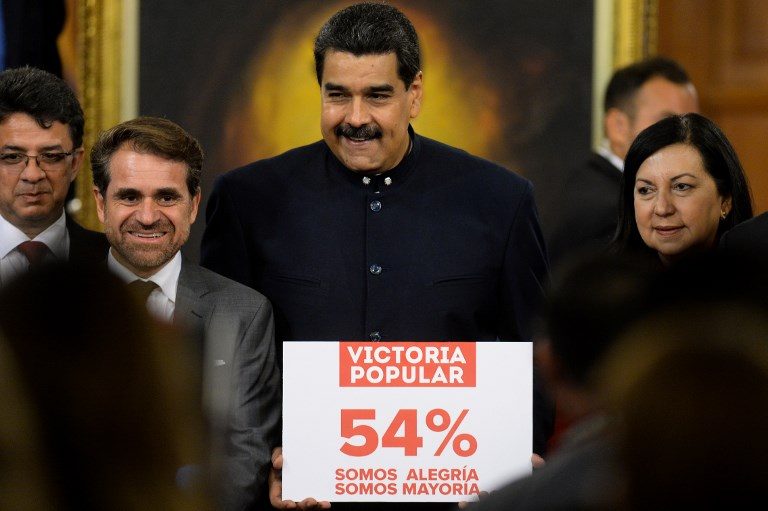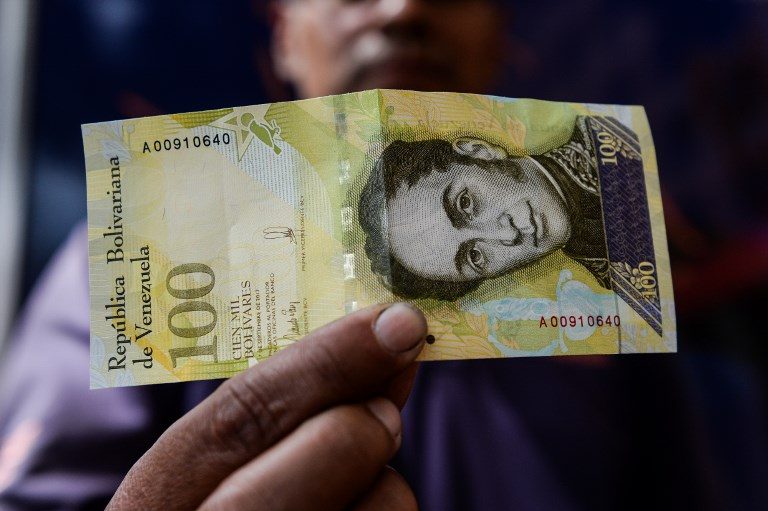SUMMARY
This is AI generated summarization, which may have errors. For context, always refer to the full article.

CARACAS, Venezuela – Monday, November 13, looks like crunch day for Venezuela, with a planned Caracas meeting for creditors to discuss debt restructuring, a New York bondholders’ meeting that could lead to a default announcement, and new EU sanctions.
Combined, the events point to a day of reckoning for the OPEC-member nation, and a tighter squeeze on its beleaguered President Nicolas Maduro and his socialist government.
But when it comes to the technical world of debt trading, things remain unclear. Monday may be the day that Venezuela’s house of cards comes tumbling down. Or, judgment day may be pushed off again — though not very far by most accounts.
The Caracas meeting of foreign bondholders, called to talk over debt refinancing and restructuring Maduro wants, could bring some clarity.
Yet it’s not yet clear who will be attending, what possible terms of engagement could be set, or even if a restructuring can be brought about.
To encourage attendance, Venezuela has reportedly said Vice President Tareck el-Aissami won’t physically be there – despite being put in charge of the restructuring. US sanctions designate him a drug kingpin, with whom American entities are barred from doing business.
Default inevitable, but when?
Speaking on state television on Sunday night, Maduro struck a defiant tone, insisting his cash-strapped country would “never” default and pointed to ongoing negotiations with China and Russia.
His aim is to establish a rescheduling of repayments of the public part of Venezuela’s total debt mountain – estimated at up to $150 billion, counting sovereign bonds, debt issued by state oil company PDVSA and taken on by the two allied countries.
A default can be declared in several ways: by the major ratings agencies, big debtholders, or by the government itself.
A significant step in that direction could come in a meeting of creditors in New York under the International Swaps and Derivatives Association. Those creditors, represented by 15 financial firms which make up a Determinations Committee, started a meeting Friday and decided to continue it on Monday.
The decision before them is whether to declare conditions are met for default insurance – known as credit default swaps – have been met.
By Monday, it should be known whether most or all of $1.2 billion meant to have been paid by PDVSA last week has made it to bondholders’ accounts. As of Friday, information on that was incomplete and contradictory.
The rating agencies all forecast a Venezuelan default as inevitable, but differ on when it might occur. With less than $10 billion in hard-currency reserves, though, it cannot be far off.

Creditors’ hopes
Several in the bond-trading industry are holding out hope that Venezuela will keep up with payments, even belatedly, as it doesn’t make sense to lose liquidity by paying out the $1.2 billion if a default is going to happen anyway.
However, news on Friday that a state-owned utility, Electricidad de Venezuela, failed to make a $650 million payment within a one-month grace period bolstered creditors’ wariness that a default was unfolding.
As rough as the ride has been regarding debt, Maduro is also being buffeted by international accusations that he is acting as an autocrat — stomping on democracy by marginalizing the opposition, which controls the parliament, and stifling independent media.
The United States has imposed successive rounds of sanctions on Venezuela for that reason, most recently last week.
The European Union is poised to officially unveil its own measures on Monday, EU sources have told AFP and other media.
They are to take the form of an arms embargo meant to prevent Venezuela buying weapons, such as water cannon, and surveillance equipment that could be used for repression.
A blacklist for sanctioned Venezuelan individuals and entities would also be created, the EU sources said, though for the moment it will be empty.
“It’s a gradual, flexible and reversible tool,” one diplomatic source said.
Claudio Salerno, Venezuela’s ambassador to the EU, said in imposing sanctions the EU is “bowing to the call of the head of the empire” – President Donald Trump – adding Venezuela sees itself as a “victim.”
“The Venezuelan people will decide next year if they want to continue with this model or if they want to take another route,” she said. “It has to be decided through the polls, not through international pressure.”
The EU move, after those of the US, comes on top of widespread criticism across Latin America of Maduro’s actions — especially his appointment in August of a chamber of loyalists that has usurped parliamentary powers.
Adding to the political pressure against Maduro, Monday will also see a UN Security Council meeting called by the United States.
“As the Venezuelan economy continues to crumble, the situation will likely only worsen especially as the country is at risk of defaulting on its debt,” the US delegation said in a document calling the meeting. – Rappler.com
Add a comment
How does this make you feel?
There are no comments yet. Add your comment to start the conversation.